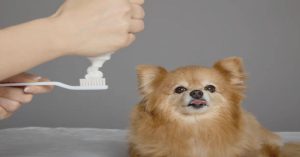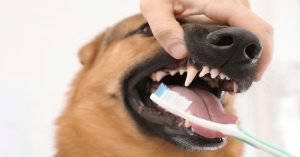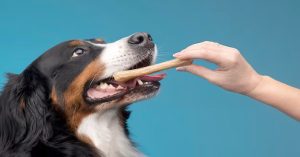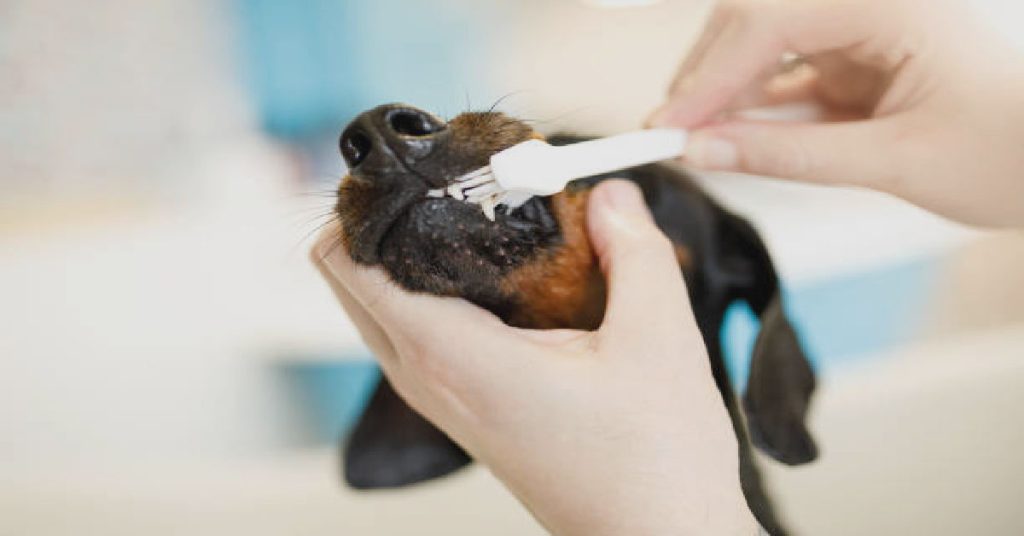Neglecting annual dental cleaning could put your dog at risk of developing gingivitis, periodontal disease, bad breath, tooth decay, and tooth loss. However, it is never too late to correct oral problems as long as the patient’s age is considered.
Proper dental care for dogs is crucial in maintaining their overall health and well-being. While many pet owners may overlook the importance of regular teeth cleaning for their canine companions, neglecting this aspect can have severe consequences. This article explores the potential risks and consequences of not cleaning a dog’s teeth, emphasizing the significance of dental hygiene for dogs.
From gingivitis to tooth loss, dental problems can cause pain, discomfort, and potentially life-threatening conditions. Fortunately, even if a dog has never had its teeth cleaned, there are still options available to rectify any oral issues. By prioritizing dental care, pet owners can ensure their furry friends’ dental health and prevent future complications.
Signs Your Dog Needs Dental Attention
Does your dog need dental attention? Neglecting teeth cleaning can lead to gum disease, bad breath, and tooth decay. Don’t wait to see a veterinarian for dental care. Just like humans, dogs also require proper dental care to maintain good oral health. However, many pet owners neglect their dog’s dental hygiene, not realizing the potential risks it poses. If your dog has never had his teeth cleaned, it’s essential to look out for signs that may indicate he needs dental attention. By being aware of these signs, you can take proactive measures to prevent dental issues and ensure your furry friend’s overall well-being.
Bad Breath As A Red Flag
One of the most common signs that your dog may need dental attention is persistent bad breath. While dog breath is not exactly minty fresh, unusually strong or foul odors coming from your dog’s mouth can be a red flag. Bad breath in dogs is often caused by the buildup of bacteria in the mouth, resulting in dental plaque and tartar. If your dog’s breath is consistently unpleasant, it’s a clear indication that his oral health needs attention.
Visible Plaque And Tartar Buildup
Another sign that your dog requires dental attention is the presence of visible plaque and tartar buildup on his teeth. You can easily identify these issues by examining your dog’s teeth and gums. Plaque appears as a sticky film on the teeth, while tartar is a hardened substance that forms when plaque is not removed. Both plaque and tartar can lead to gum disease, tooth decay, and oral discomfort for your dog. If you notice yellow or brownish deposits on your dog’s teeth, it’s time to seek professional dental care.
Changes In Eating Or Chewing Habits
Changes in your dog’s eating or chewing habits can also indicate dental problems. If your dog suddenly starts avoiding certain types of food, takes longer to finish meals, or exhibits difficulty chewing, it may be a sign that his teeth are causing discomfort. Dental issues, such as gum inflammation or tooth decay, can make it painful for your dog to eat or chew. Additionally, you may observe your dog favoring one side of his mouth while eating, which can indicate dental pain in a specific area. Overall, it’s crucial to pay attention to your dog’s dental health and address any signs of potential problems promptly. Regular dental cleanings performed by a veterinarian, combined with proper at-home dental care, can help maintain your dog’s oral hygiene and prevent dental issues in the long run.
Risks Of Poor Oral Hygiene In Canines
Neglecting regular teeth cleaning for your dog can lead to serious consequences such as gingivitis, periodontal disease, bad breath, tooth decay, and even tooth loss. Make sure to prioritize your dog’s oral hygiene to avoid these risks.
Connection Between Dental Disease And Overall Health:
Poor oral hygiene in canines can have drastic consequences for their overall health. Just like humans, dogs can suffer from dental diseases, such as gum infections, periodontal disease, and tooth decay. However, many pet owners fail to realize the strong connection between oral health and the overall well-being of their beloved furry friends.
How Neglected Teeth Can Lead To Serious Complications:
When a dog’s teeth are left uncared for and never cleaned, a range of serious complications can arise. The accumulation of plaque and tartar can lead to gum inflammation, a condition known as gingivitis. Over time, if left untreated, this can progress to periodontal disease, causing damage to the gum tissue, tooth loss, and even bone infection. Poor oral hygiene can also result in persistent bad breath, which is not only unpleasant but may also indicate the presence of underlying dental issues. Additionally, neglected teeth can harbor harmful bacteria, which can enter the bloodstream and potentially affect vital organs like the heart, liver, and kidneys. These systemic infections can have dire consequences for a dog’s overall health and may even be life-threatening in severe cases.
Preparing For Your Dog’s First Dental Cleaning
Preparing for your dog’s first dental cleaning is important, especially if your dog has never had his teeth cleaned. Neglecting dental cleaning can lead to dental problems such as bad breath, gingivitis, and tooth decay, so it’s crucial to prioritize your dog’s oral health.
Consider visiting a veterinary dentist for professional cleaning and maintaining regular dental care for a healthy and happy dog.
Choosing The Right Veterinary Dentist
When it comes to ensuring the best dental care for your beloved furry friend, choosing the right veterinary dentist is crucial. A veterinary dentist specializes in oral health care for animals and has the necessary expertise to perform dental cleanings and procedures safely and effectively. To choose the right veterinary dentist for your dog’s first dental cleaning, consider the following factors:
1. Experience and Credentials: Look for a veterinary dentist with significant experience and the necessary credentials. Check if they are board-certified or belong to professional organizations like the American Veterinary Dental College (AVDC).
2. Referrals and Reviews: Ask your regular veterinarian or fellow pet owners for recommendations. Additionally, read online reviews and testimonials to gauge the quality of care provided by the dentist.
3. Facility and Equipment: Visit the dental clinic or hospital to assess the cleanliness, hygiene, and availability of advanced dental equipment. A well-equipped facility indicates that the dentist is up-to-date with the latest techniques and technologies.
4. Communication and Rapport: A good veterinary dentist should be able to communicate clearly and develop a rapport with you and your dog. They should explain the dental cleaning process, answer your questions, and provide post-cleaning care instructions.
What To Expect During The Dental Exam
During your dog’s first dental examination and cleaning, you can expect the following:
1. Pre-Exam Assessment: The veterinary dentist will conduct a thorough assessment of your dog’s dental health, which may include a visual examination, dental X-rays, and periodontal probing. They will identify any underlying dental issues, such as tartar buildup, periodontal disease, cavities, or infected teeth.
2. Anesthesia Administration: To ensure a comfortable and stress-free experience, the veterinary dentist will administer anesthesia. This allows them to perform a thorough cleaning without causing any discomfort to your dog.
3. Tartar Removal and Scaling: The dentist will use specialized dental instruments to remove tartar and plaque from your dog’s teeth. They will also perform scaling to clean the surfaces under the gumline, where most dental problems tend to occur.
4. Polishing and Fluoride Treatment: After tartar removal, the dentist will polish your dog’s teeth to smooth any rough surfaces and make them less prone to future plaque buildup. They may also apply a fluoride treatment to strengthen the teeth and protect against tooth decay.
5. Post-Exam Care Instructions: Once the dental cleaning is complete, the veterinary dentist will provide you with detailed post-exam care instructions. They may recommend specific dental products, such as toothbrushes or dental chews, to maintain your dog’s oral hygiene. Remember, regular dental cleanings are essential for your dog’s overall health and well-being. By preparing ahead of time and choosing the right veterinary dentist, you can ensure a positive and successful first dental cleaning experience for your four-legged friend.
Steps Involved In Professional Teeth Cleaning
Professionally cleaning a dog’s teeth involves several important steps to ensure a safe and thorough process. One crucial aspect is the use of anesthesia, which allows the veterinarian or dental technician to clean all areas of the mouth without causing discomfort or stress to the dog. Anesthesia also ensures that the dog remains still and cooperative during the cleaning procedure, minimizing the risk of injury for both the dog and the dental professional. Once the dog is under anesthesia, the dental professional can proceed with the necessary steps to clean the teeth effectively.
The first step is scaling, which involves removing plaque and tartar buildup from the teeth, including the areas below the gum line. This process helps prevent gum disease and tooth decay. After scaling, the teeth are polished to create a smooth surface that helps discourage plaque and tartar accumulation in the future. Polishing also improves the overall appearance of the teeth. In some cases, extractions may be necessary, particularly if there are severely damaged or decayed teeth.
The dental professional will carefully evaluate the condition of each tooth and discuss any extractions that are recommended for the dog’s oral health. Overall, professional teeth cleaning involves these essential steps: anesthesia for safe and thorough cleaning, scaling to remove plaque and tartar, polishing to create a smooth surface, and the possibility of extractions if needed. These steps ensure that your dog’s teeth receive the necessary care to maintain oral health and prevent potential complications in the future.
Implementing Daily Teeth Brushing Routines
Implementing a daily teeth brushing routine for your dog is crucial, especially if they have never had their teeth cleaned before. Neglecting dental hygiene can lead to issues such as bad breath, gum disease, and even tooth loss. Take the necessary steps to ensure your dog’s oral health remains in good condition.
Selecting The Right Toothbrush And Toothpaste
When it comes to implementing a daily teeth brushing routine for your dog, selecting the right toothbrush and toothpaste is crucial. Not all toothbrushes and toothpastes are created equal, so it’s important to choose products specifically designed for canine dental care.
Techniques For Brushing Your Dog’s Teeth
Brushing your dog’s teeth may seem like a challenging task, but with the right techniques, it can become a seamless part of your daily routine. Here are some tips to ensure effective brushing:
- Introduce your dog to the toothbrush gradually. Let them sniff and lick it to familiarize themselves with the texture and taste.
- Use a dog-friendly toothpaste. Human toothpaste contains ingredients that can be harmful to dogs, so always opt for toothpaste specifically formulated for canines.
- Gently lift your dog’s lips and start brushing in a circular motion, focusing on the gumline and the back molars.
- Brush for about two minutes, ensuring you cover all areas of the mouth.
- Pay extra attention to any areas of tartar buildup or sensitivity.
- Offer praise and rewards throughout the brushing process to make it a positive experience for your dog.
- Make sure to brush your dog’s teeth at least once a day or as recommended by your veterinarian.
By implementing these techniques and being consistent with your dog’s daily teeth brushing routine, you can significantly improve their oral hygiene and overall health. Remember, patience and persistence are key when it comes to successfully brushing your dog’s teeth.
Chew Toys And Dental Treats For Oral Health
Improve your dog’s oral health with chew toys and dental treats. Even if your dog has never had their teeth cleaned, these products can help remove plaque and prevent dental problems like bad breath and tooth decay. Give your furry friend a happy, healthy smile!
How They Can Help With Plaque Removal
Chew toys and dental treats are not only a great source of entertainment for your furry friend but also play a vital role in maintaining their oral health. These chew toys and dental treats are designed to promote chewing, which in turn helps remove plaque from your dog’s teeth. The act of chewing stimulates saliva production, which is nature’s way of naturally cleansing the mouth and removing food particles and bacteria. Additionally, the rough texture of chew toys and dental treats provides a gentle abrasive action that helps scrub away plaque buildup.
Recommendations For Effective Products
When it comes to choosing chew toys and dental treats for your dog, it’s important to select products that are specifically designed to promote oral health. Look for products that are endorsed or recommended by veterinary professionals. Here are a few recommendations for effective chew toys and dental treats:
- Vet’s Best Dental Care Finger Wipes
- Petlab Co. Dog Dental Formula Kit
- Arm & Hammer Tartar Control Dental Spray
- Oravet Dental Hygiene Chews
- Dental Fresh Advanced Plaque & Tartar Oral Cleansing Liquid
These products are specially formulated to help prevent plaque buildup, freshen breath, and promote overall dental hygiene in dogs. Remember to always supervise your dog while they are chewing on toys or enjoying dental treats to ensure they are using them safely. In conclusion, incorporating chew toys and dental treats into your dog’s routine can be a simple and effective way to improve their oral health. By providing them with appropriate products that promote chewing and plaque removal, you can help prevent dental problems such as plaque buildup, bad breath, and gum disease. So why not give your furry friend something tasty to chew on while also taking care of their teeth? Your dog will thank you with a healthy smile and fresh breath!
Evaluating Your Dog’s Oral Health Post-cleaning
Post-cleaning, it’s important to evaluate your dog’s oral health, especially if your dog has never had his teeth cleaned before. Neglecting dental cleaning can lead to issues such as gingivitis, periodontal disease, bad breath, tooth decay, and tooth loss. It’s never too late to prioritize your dog’s oral care.
Regular Dental Check-ups and What to Monitor Keeping up with regular dental check-ups after your dog’s teeth cleaning session is crucial for maintaining their oral health. These check-ups allow the veterinarian to assess the condition of your dog’s teeth and gums and monitor any potential issues or improvements. During these appointments, the veterinarian will perform a thorough examination, including checking for plaque buildup, tartar, gum disease, and signs of tooth decay. Signs of Improvement in Your Dog’s Oral Hygiene Once your dog has had their teeth cleaned, there are several positive signs to look out for that indicate an improvement in their oral hygiene.
These signs include:
1. Fresher Breath: One of the most noticeable changes post-cleaning is a significant improvement in your dog’s breath. Gone are the days of smelly doggie breath, as the removal of plaque and tartar helps eliminate the bacteria responsible for causing bad breath.
2. Healthier Gums: Healthy gums should appear pink, firm, and free from swelling or bleeding. After a thorough cleaning, you should observe an overall improvement in the condition of your dog’s gums. If you notice any persistent redness, inflammation, or bleeding, it is essential to consult your veterinarian.
3. Reduced Plaque and Tartar: A successful teeth cleaning session will remove the built-up plaque and tartar from your dog’s teeth. You may notice a significant reduction in yellowish-brown deposits, giving your dog’s teeth a cleaner and whiter appearance.
4. Improved Eating Experience: Dental issues can make eating uncomfortable and painful for your dog. However, after their teeth cleaning, you may notice that your furry friend becomes more enthusiastic about their meals, suggesting an improved eating experience without oral discomfort.
5. Preventing Further Complications: Regular teeth cleanings help prevent future dental complications such as gingivitis, gum disease, loose teeth, and tooth decay. By ensuring your dog receives the necessary dental care, you can minimize the risk of these issues and improve their overall oral health. Remember, maintaining optimal oral health for your dog requires regular dental check-ups and proper home dental care. By monitoring these signs of improvement and staying proactive, you can keep your dog’s teeth and gums healthy in the long run.
Regular Dental Check-ups And What To Monitor
Regular dental check-ups are essential for evaluating your dog’s oral health post-cleaning. During these check-ups, the veterinarian will assess your dog’s teeth and gums, checking for any signs of plaque buildup, tartar, gum disease, or tooth decay. By monitoring these aspects, you can ensure that your dog’s oral health remains in good condition. It is important to schedule these check-ups on a regular basis to address any emerging issues promptly.
Signs Of Improvement In Your Dog’s Oral Hygiene
Once your dog has had their teeth cleaned, it is crucial to be aware of the signs that indicate an improvement in their oral hygiene. These signs include fresher breath, healthier gums, reduced plaque and tartar, an improved eating experience, and the prevention of further complications. By observing these positive changes, you can ensure that your dog maintains a healthy and pain-free oral cavity.
Sustaining Your Dog’s Dental Health
When it comes to your furry friend’s overall health and well-being, ensuring proper dental care is crucial. Many dog owners overlook the dental health aspect, assuming that their dog’s teeth are fine as long as they eat well. However, it’s essential to understand that neglecting your dog’s dental health can lead to various dental problems such as gingivitis, periodontal disease, bad breath, tooth decay, and even tooth loss.
Diet Considerations That Impact Dental Well-being
Diet plays a vital role in sustaining your dog’s dental health. Just like humans, dogs need a balanced diet that supports their oral health. Incorporating certain dietary considerations can contribute to healthier teeth and gums for your furry companion.
- Choose high-quality dog food with good nutritional value, avoiding excessive amounts of sugars and carbohydrates.
- Include dental-specific dog treats or chews that help remove plaque and tartar buildup while promoting healthier teeth and gums.
- Ensure your dog has access to fresh water at all times to maintain hydration and oral health.
Importance Of Consistent Oral Hygiene Practices
Consistent oral hygiene practices are essential for your dog’s overall dental health. While a healthy diet is vital, it is not enough to solely rely on food and treats to maintain a clean mouth. Just like humans, dogs require regular dental care to prevent dental issues.
Here are a few important oral hygiene practices to consider:
- Brush your dog’s teeth regularly using a dog-specific toothbrush and toothpaste. Aim for at least two to three times a week to remove plaque and prevent tartar buildup.
- Encourage chewing on appropriate dental chew toys, as this can help remove plaque and keep your dog’s teeth clean.
- Schedule annual dental check-ups with your veterinarian to detect any underlying dental issues and ensure proper dental care.
By incorporating these oral hygiene practices into your dog’s routine, you can help maintain their dental health and prevent potential dental problems. Remember, it’s never too late to start implementing these habits and providing necessary dental care to your furry friend.
Frequently Asked Questions
What If You Never Get Your Dogs Teeth Cleaned?
Neglecting annual dental cleaning for your dog can lead to gingivitis, periodontal disease, bad breath, tooth decay, and tooth loss. Regular teeth cleaning is important to prevent plaque build-up and dental problems. It’s never too late to correct oral problems, as long as the dog’s age is considered.
Without brushing, plaque can cause infections and life-threatening conditions. See a veterinary dentist if your dog has never had their teeth cleaned.
Is It Too Late To Have My Dogs Teeth Cleaned?
It’s never too late to have your dog’s teeth cleaned. Age should be considered, but oral problems can still be corrected. Neglecting dental cleaning can lead to gingivitis, bad breath, tooth decay, and tooth loss. Regular cleaning is important to prevent these issues.
What Happens If You Never Brush Your Dog’s Teeth?
Neglecting to brush your dog’s teeth can lead to plaque build-up, bad breath, gum disease, and tooth decay. It can also cause painful infections and potentially life-threatening conditions. Regular brushing is important to maintain your dog’s dental health and prevent these issues.
Is Dog Teeth Cleaning Really Necessary?
Regular dog teeth cleaning is necessary to prevent plaque build-up and dental problems. Neglecting dental care can lead to gingivitis, bad breath, and even tooth loss. It’s never too late to start cleaning your dog’s teeth, as long as you prioritize their oral health.
Why Is It Important To Get My Dog’s Teeth Cleaned Regularly?
Regular dental cleaning prevents gingivitis, bad breath, tooth decay, and tooth loss in your dog.
Conclusion
Regular dental care for dogs is essential to maintain their overall health and well-being. Neglecting to have your dog’s teeth cleaned can lead to various dental problems, including gum disease, bad breath, and tooth decay. These issues can cause discomfort and pain for your furry friend.
While it may never be too late to start dental care, prevention is always better than cure. So, could you prioritize your dog’s dental health by visiting a veterinary dentist regularly and implementing a proper dental hygiene routine? Your dog will thank you with a healthy and happy smile!
Related posts:
 How Often Should You Get Your Dog’s Teeth Cleaned?Essential Dental Care Tips
How Often Should You Get Your Dog’s Teeth Cleaned?Essential Dental Care Tips
 Can You Floss Dog’S Teeth ? Expert Tips for Pet Dental Care
Can You Floss Dog’S Teeth ? Expert Tips for Pet Dental Care
 When Do Golden Retrievers Lose Their Baby Teeth?A Guide for Pet Owners
When Do Golden Retrievers Lose Their Baby Teeth?A Guide for Pet Owners
 When Do Golden Retrievers Stop Teething? Answers and Tips
When Do Golden Retrievers Stop Teething? Answers and Tips
 Why Does My Dog Show His Teeth?
Why Does My Dog Show His Teeth?
 How Strong are Dogs Teeth?
How Strong are Dogs Teeth?

